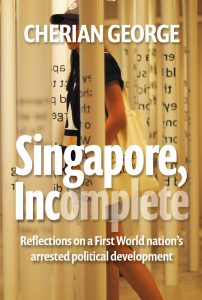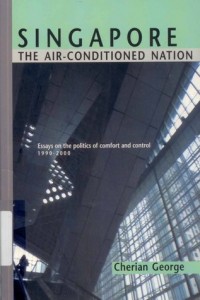THE MYTH OF THE ONLINE BYPASS
Text of a talk delivered at the Singapore Management University law school on 3 September. First published in journalism.sg.
When I started writing about press freedom issues more than 25 years ago, most Singaporeans seemed to believe that independent media might actually cause more harm than good in a country that was already pretty well governed. It wasn’t that they believed that their press was free. They just didn’t care that it wasn’t.
Today, most Singaporeans seem equally unconvinced that press freedom is an important issue. However, the reasons have changed. Singaporeans no longer take good governance for granted and they are much more prepared to speak up on national issues. It’s just that they don’t feel they need the press to magnify their voices.
Today’s internet-enabled citizens feel empowered to say almost anything, whenever, however and to whomever they wish. Seized by this new sense of efficacy, many critical Singaporeans feel they have outgrown the national media. They opine that if the mainstream press is government-controlled, it can go to hell (netizens not being known for polite euphemisms).
This confidence is based on the assumption that if the main arteries feeding information and ideas to the country’s democratic heart are politically clogged, we can still rely on a free-flowing online bypass.
This confidence is misplaced. Yes, blogs and online forums add precious diversity to the media landscape in Singapore, just as alternative media do in every society. But alternative media, while necessary, are not sufficient. And mainstream media, while not sufficient, are still necessary.
Therefore, Singaporeans who care about our democratic development still need to be concerned about restrictions that handicap traditional news organisations in fulfilling their professional roles.
Restrictions
Before I explain why, let’s be clear about the extent of those restrictions. Media freedom is not absolute anywhere in the world, either in practice or in principle. So the problem is not that Singapore’s media are regulated as such, but that the manner of regulation is not in keeping with what is currently regarded as international best practice.
International human rights law has worked out certain principles for balancing rights and responsibilities. The proper balance will differ from country to country, but there are certain “out of bounds” markers that governments should not cross when they regulate freedom of speech. Courts elsewhere increasingly apply a so-called “three-part test” to judge whether a government is crossing the OB markers.
First, any restrictions should be done according to written laws – laws that are precise, clear and predictable. We are certainly not as bad as dictatorships where strongmen rule by edict and impose arbitrary, whimsical punishments. However, Singapore fails this first test by having a number of restrictions that are vaguely worded, and that are effected administratively at the discretion of officials and without judicial review. The executive can, for example, revoke or deny a publishing permit at any time and is under no legal obligation to give any reasons.
The second part of the three-part test is that any limitation on freedom of expression must be for a legitimate purpose. In international law, the only legitimate aims are to protect the rights or reputations of others, national security or public order, or public health or morals. What is absolutely rejected as a legitimate aim of censorship is to make the government’s job easier. Singapore crosses this OB marker as well – the government has been quite forthright in claiming the authority to set the national agenda and to govern decisively, even if it means restricting the press.
The third part of the test is that any restriction must be necessary and proportionate, and not engage in overkill. The proscription must match the supposed threat to society. Singapore again fails on this score. For example, the preservation of multi-racial, multi-religious peace is the most commonly cited reason why our press needs close supervision – but it has never been adequately explained why, in order to achieve this, it has been necessary for the chairmen of Singapore Press Holdings to be former Cabinet ministers, as if other able Singaporeans lack the instincts to protect national interests.
The net effect of the government’s press policy is that when covering controversial issues where there is a significant divergence between government positions and public opinion, newspapers are expected to educate the public at the expense of reflecting ground sentiment – even if journalists themselves are not persuaded. As government policy states unequivocally, press freedom must be “subordinate to the primacy of purpose of an elected government” in such instances.
The government wants the space to effect unpopular policies that are beneficial for the country in the long term – not a bad thing – but it may end up protecting itself from the kind of accountability that would keep it honest and responsive to the public. And without open debate, it is too easy to slip from the former to the latter.
The online option
Many bloggers and online commentators are motivated by the desire to use the relative freedom of the internet to make up for traditional media’s democratic deficiencies. And certainly, alternative online media are a vital complement to mainstream media. As I argued in my 2006 book, Contentious Journalism, they enable access for voices and interests that, for a mix of reasons, are marginalised by professional, commercial and licensed media sector.
The question is whether they can not only supplement but also substitute for mainstream journalism.
Doubts have been expressed for decades about the power of digital media, some less credible than others. One early question was whether electronic platforms could ever be as practical as ink on paper. Newspapers, it was said, passed the toilet test with flying colours: you can even carry them into the loo with you. IPads and 3G phones have closed that gap, and fewer people make the argument that newspapers are inherently more convenient.
What continues to be taken seriously, though, is the argument that newspapers, for all their faults, are still required for gathering the public in a collective dialogue about matters of public interest. This is the so-called “public sphere” function of the press. The internet as a whole may approximate a public sphere, but the problem is that we don’t engage with the internet as a whole. We visit specific websites and forums, most of which are self-selecting and narrower in their constituencies than national newspapers.
Democracy requires the right to speak, and this is where the internet has come to the fore. But democracy also expects of citizens that we listen, to hear views different from our own, to negotiate and, if necessary, compromise. We need spaces for such deliberation and social conciliation.
The evidence from internet research so far is mixed, with some studies pointing to an echo chamber effect, while others claim that the internet introduces people to a wider range of views than mainstream media do. While there is some evidence that the internet allows people to engage more meaningfully in public life, there are also studies that say that new media equally allow people to distract themselves from public affairs.
But, all said and done, it is probably the case that if newspapers were to die tomorrow, it would be fairly easy for one or more internet sites to fill the void as a space for a national conversation.
Professional journalism
There is, however, a third role that newspapers play that online media show no signs of taking on. As much as our blogs claim to be monitoring the powerful, the reality is that their capacity is extremely limited. One limitation is their lack of training and experience, in making ethical judgment calls and in separating reliable information from gossip. This gap may be overstated. Journalism is not rocket science and I think it is possible for bloggers to develop professional journalism skills.
However, there is a bigger – and so far unbridgeable – gap that we need to take far more seriously. This is the gap between what can be accomplished by large teams of professional, full-time journalists versus small collectives of part-time amateurs. No matter how intelligent, talented and sincere the latter are, there are simply practical limits to what they can accomplish without sufficient time and organisational back-up.
Yes, they may occasionally cover certain issues comprehensively and thoroughly. When certain events are exciting enough, they may be able to crowd-source investigative reports from an army of committed volunteers. But providing sustained, daily, disciplined monitoring of trends and institutions is beyond them.
Singapore is not a kampong. We are a thriving metropolis of 5 million people with economic activities on a scale that surpasses most countries. Monitoring the opportunities and threats within our country (and beyond our shores) is a prerequisite for individual, household and corporate survival. We can’t do this ourselves (even in partnership with our Facebook friends). And it is also fanciful to imagine that we can delegate the job entirely to amateur, part-time, unpaid citizen reporters.
To reiterate, citizen reporting and alternative media are a vital supplement – but they cannot meet all our democratic needs.
Too much of society’s business takes place during office hours, when our bloggers are busy with their day jobs or in school. And a lot of what needs to be kept track of – meetings, press conferences, reports, community events, business deals – is, quite frankly, so boring that no volunteer would be willing to do it for us. We actually need to pay someone to do it – sit through meetings, read reports cover to cover and so on – to find those bits of information that are relevant and important for the public, and then to connect the dots.
Often, of course, you can find experts in a given field who know a subject better than the most seasoned beat correspondent in a newspaper. No doubt, there are educationists who know their subject better than the education correspondents of the Straits Times, and law professors who understand their subject better than any legal affairs or crime reporter. When such experts blog, they certainly contribute to our collective enlightenment. And they may make us wonder if we need professional journalists any more to analyse things for us.
Again, though, we need to be more circumspect about whether experts turned amateur journalists can actually replace professional journalists entirely. Like other bloggers, these experts tend to be sporadic in their contribution.
But, more importantly, they tend to be embedded in professions and organisations and may feel no responsibility to escape their vested interests. In contrast, journalism as a profession accepts as its core mission (even if it doesn’t always achieve this) circulating information that helps citizens make sense of change and take part in democratic life. No other group claims to want to fill this social role and can be held up to that standard.
No online business model yet
What I’ve been stressing so far is the unique and indispensable function of professional journalism. In theory of course, there is no reason why professional journalism can only take place in newspapers.
In practice, though, newspapers have always provided and continue to provide the most hospitable business model for sustaining professional newsrooms.
Investigation, fact-checking and sense-making for a large, diverse population in a complex, fast-moving society is a resource intensive enterprise. It just cannot be done solely by small teams of part-timers and volunteers. You need newsrooms of 30 to 300 full-time professional journalists.
Can online media sustain such newsrooms? The closest we have to that is Yahoo! News, but although it is the country’s number one online news source, it is obvious that its capacity to generate original content is extremely limited. Regardless of how the ongoing copyright suit filed by SPH against Yahoo! is decided, it is noteworthy that even Yahoo! isn’t claiming that its reporting was original – it is merely claiming that it had a right to crib.
As for our amateur socio-political blogs, some have explored possible revenue streams, but I know of no blog that any longer has pretentions of becoming Singapore’s Malaysiakini (which has daily output in four languages produced by a full-time team of 70).
If a business model can be found for independent online journalism in Singapore, it would be a huge step forward for democratic communication. It would combine the value of professional journalism with the relative freedom of the internet.
But there is no sign that this will arrive soon. Until then, those who believe that greater freedom of expression is necessary for Singapore’s democratic progress should understand that newspapers must be part of the solution. And if Singaporeans feel that the press system is underperforming, they need to reform it – not ignore it.







